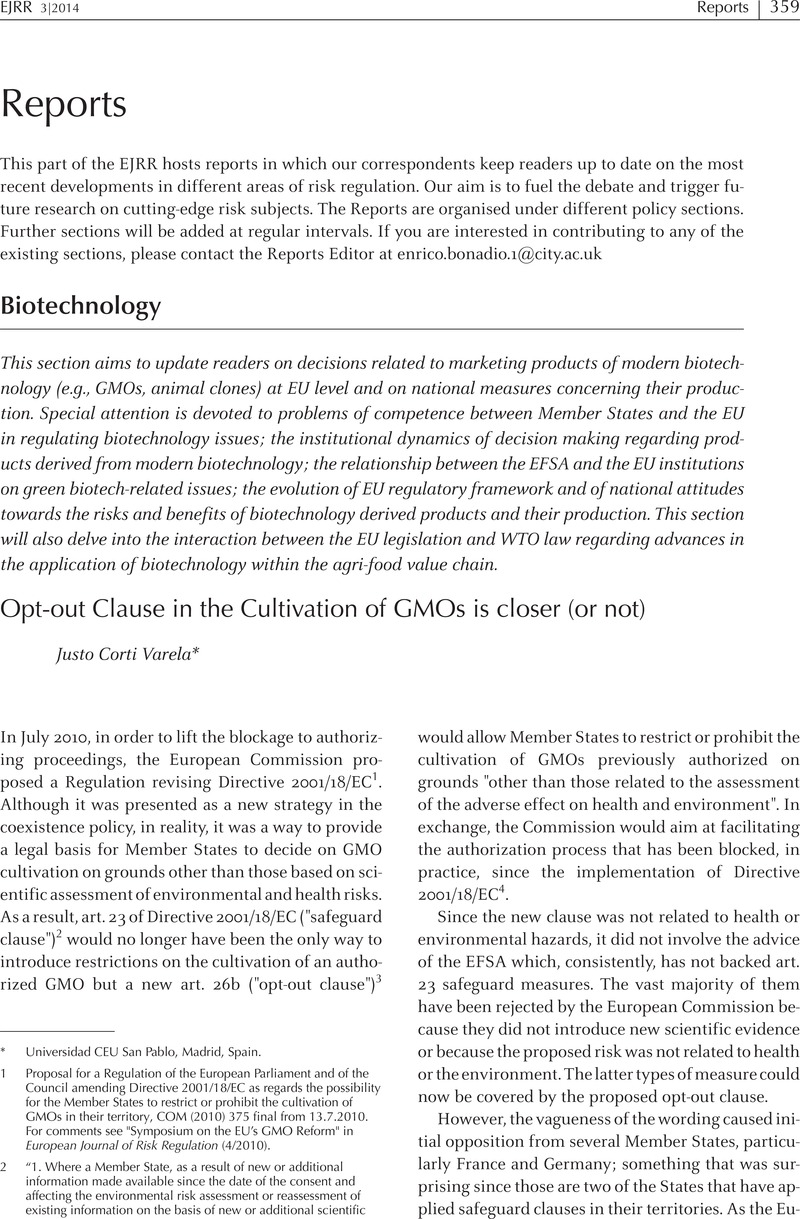No CrossRef data available.
Article contents
Opt–out Clause in the Cultivation of GMOs is closer (or not)
Published online by Cambridge University Press: 20 January 2017
Abstract

- Type
- Reports
- Information
- Copyright
- Copyright © Cambridge University Press 2014
References
1 Proposal for a Regulation of the European Parliament and of the Council amending Directive 2001/18/EC as regards the possibility for the Member States to restrict or prohibit the cultivation of GMOs in their territory, COM (2010) 375 final from 13.7.2010. For comments see “Symposium on the EU's GMO Reform” in European Journal of Risk Regulation (4/2010).
2 “1. Where a Member State, as a result of new or additional information made available since the date of the consent and affecting the environmental risk assessment or reassessment of existing information on the basis of new or additional scientific or in a product which has been properly notified and has received written consent under this Directive constitutes a risk to human health or the environment, that Member State may provisionally restrict or prohibit the use and/or sale of that GMO as or in a product on its territory…”
3 “Member States may adopt measures restricting or prohibiting the cultivation of all or particular GMOs authorised in accordance with Part C of this Directive or Regulation (EC) No 1829/2003, and consisting of genetically modified varieties placed on the market in accordance with relevant EU legislation on the marketing of seed and plant propagating material, in all or part of their territory, provided that: (a) those measures are based on grounds other than those related to the assessment of the adverse effect on health and environment which might arise from the deliberate release or the placing on the market of GMOs; and, (b) that they are in conformity with the Treaties. By way of derogation to Directive 98/34/EC, Member States that intend to adopt reasoned measures under this Article shall communicate them to the other Member States and to the Commission, one month prior to their adoption for information purposes.“
4 For a recent comment on the difficulties in the decision-making, see Weimer Maria, “Risk regulation, GMOs, and the challenges to deliberation in EU Governance Politicization and scientification as co-producing trends,” Amsterdam Centre for European Law and Governance Working Paper Series 2014 - 03.
5 European Economic and Social Committee Opinion on the Proposal for a Regulation amending Directive 2001/18/EC as regards the possibility for the Member States to restrict or prohibit the cultivation of GMOs in their territory: COM(2010) 375 final.
6 In the Biotech case the WTO condemned the EC laxity in the control on illegal application of the safeguard clause. Member States applied the safeguard clause using non science-sound arguments, which was against the spirit and wording of art. 23. However, the European Commission could not achieve a political agreement in the Council for condemning this practice. Hence, the WTO Panel understood that the EC was consenting restrictions on non-scientific arguments, which was against the WTO law. See Panel Reports, European Communities – Measures Affecting the Approval and Marketing of Biotech Products, WT/DS291/R / WT/DS292/R / WT/DS293/R / Add.1 to Add.9 and Corr.1, adopted 21 November 2006, DSR 2006:III, p. 847.
7 A blocking minority conformed by UK, France and Denmark continued arguing its serious doubts on the legal compatibility of some provisions in the proposal with WTO and EU internal market rules. See Environmental Council Conclusions, 9 March 2012, 7478/12, Presse 99, PR CO 13, p. 11.
8 According to the original proposal, Member States would have merely had to inform other Member States and the Commission one month prior to the adoption of their measures. However, the new version requires Member States to provide the Commission with a draft of the measures three months before their implementation and, at the end of the “standstill period”, Member States would be able to decide to modify the measures, taking account of the Commission's comments, or adopt them in the form that they had been proposed.
9 Report of 20 April 2011 on the proposal for a regulation of the European Parliament and of the Council amending Directive 2001/18/EC as regards the possibility for the Member States to restrict or prohibit the cultivation of GMOs in their territory (COM(2010)0375 – C70178/2010 – 2010/0208(COD)). Committee on the Environment, Public Health and Food Safety. Rapporteur: Corinne Lepage. Ref. A7-0170/2011.




